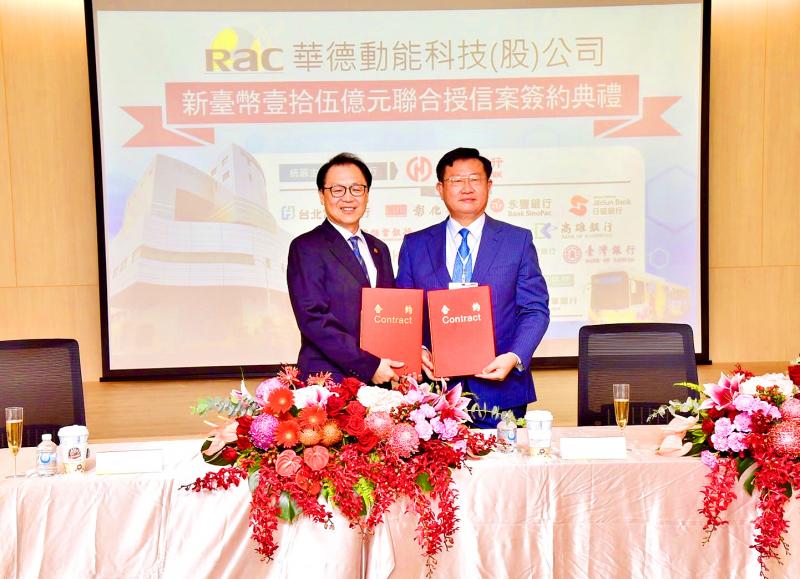RAC Electric Vehicles Inc (華德動能科技) has secured a NT$1.5 billion (US$50.2 million) syndicated loan to fund its capacity expansion after receiving significant orders from customers, the electric bus manufacturer said yesterday.
Hua Nan Commercial Bank (華南銀行) acted as the lead arranger of the syndicated loan, with 15 other banks participating, RAC said in a statement.
The lenders have oversubscribed to the loan by more than 100 percent, it said.

Photo courtesy of Hua Nan Commercial Bank
RAC has won bids to supply 169 new electric buses to the nation’s major bus operators, including Capital Bus Co (首都客運), Danan Bus Co (大南客運) and Geya Bus Transport Co (巨業交通), through a government pilot program. The operators run services in Taipei, New Taipei City, Taichung and Kaohsiung.
Winning bidders are to receive a subsidy of up to NT$10 million per vehicle. The program aims to boost production of locally made electric buses to 16,000 units a year by 2030.
RAC plans to ship 105 electric buses this year, most of which would be delivered in the second half, it said.
The Taoyuan-based company last year delivered 33 electric buses to local bus operators, such as San Chung Bus Co (三重客運), it added.
To cope with rising customer demand, RAC’s parent company, Mobiletron Electronics Co (車王電子), has spent NT$2.5 billion to build a factory in Taichung for RAC to expand its capacity. The new factory has an installed capacity of 1,700 electric buses and 6,000 automobile chassis a year.
The plant is to start operations next quarter, RAC said.
Mobiletron owns a 54.64 percent stake in RAC.
The electric vehicle company has also expanded its business overseas and is working with Sumitomo Corp to ship electric buses to Japan, it said.
RAC delivered the first batch of electric buses to Japan in April to be used in Kyushu, it added.
RAC reported net losses of NT$138.03 million last year, compared with losses of NT$154 million in 2020. Losses per share improved to NT$1.53 last year, from NT$2.03 in the preceding year.

CHIP RACE: Three years of overbroad export controls drove foreign competitors to pursue their own AI chips, and ‘cost US taxpayers billions of dollars,’ Nvidia said China has figured out the US strategy for allowing it to buy Nvidia Corp’s H200s and is rejecting the artificial intelligence (AI) chip in favor of domestically developed semiconductors, White House AI adviser David Sacks said, citing news reports. US President Donald Trump on Monday said that he would allow shipments of Nvidia’s H200 chips to China, part of an administration effort backed by Sacks to challenge Chinese tech champions such as Huawei Technologies Co (華為) by bringing US competition to their home market. On Friday, Sacks signaled that he was uncertain about whether that approach would work. “They’re rejecting our chips,” Sacks

NATIONAL SECURITY: Intel’s testing of ACM tools despite US government control ‘highlights egregious gaps in US technology protection policies,’ a former official said Chipmaker Intel Corp has tested chipmaking tools this year from a toolmaker with deep roots in China and two overseas units that were targeted by US sanctions, according to two sources with direct knowledge of the matter. Intel, which fended off calls for its CEO’s resignation from US President Donald Trump in August over his alleged ties to China, got the tools from ACM Research Inc, a Fremont, California-based producer of chipmaking equipment. Two of ACM’s units, based in Shanghai and South Korea, were among a number of firms barred last year from receiving US technology over claims they have

It is challenging to build infrastructure in much of Europe. Constrained budgets and polarized politics tend to undermine long-term projects, forcing officials to react to emergencies rather than plan for the future. Not in Austria. Today, the country is to officially open its Koralmbahn tunnel, the 5.9 billion euro (US$6.9 billion) centerpiece of a groundbreaking new railway that will eventually run from Poland’s Baltic coast to the Adriatic Sea, transforming travel within Austria and positioning the Alpine nation at the forefront of logistics in Europe. “It is Austria’s biggest socio-economic experiment in over a century,” said Eric Kirschner, an economist at Graz-based Joanneum

OPTION: Uber said it could provide higher pay for batch trips, if incentives for batching is not removed entirely, as the latter would force it to pass on the costs to consumers Uber Technologies Inc yesterday warned that proposed restrictions on batching orders and minimum wages could prompt a NT$20 delivery fee increase in Taiwan, as lower efficiency would drive up costs. Uber CEO Dara Khosrowshahi made the remarks yesterday during his visit to Taiwan. He is on a multileg trip to the region, which includes stops in South Korea and Japan. His visit coincided the release last month of the Ministry of Labor’s draft bill on the delivery sector, which aims to safeguard delivery workers’ rights and improve their welfare. The ministry set the minimum pay for local food delivery drivers at